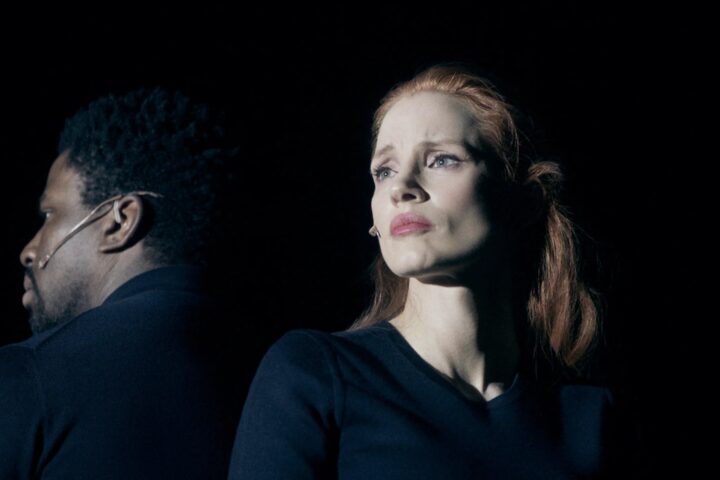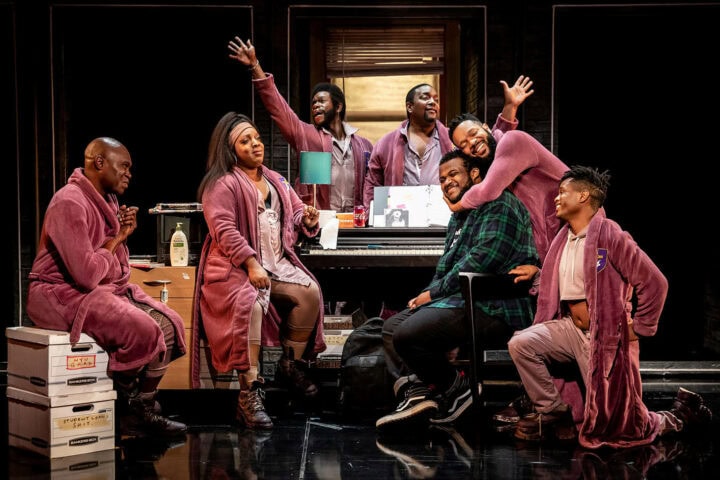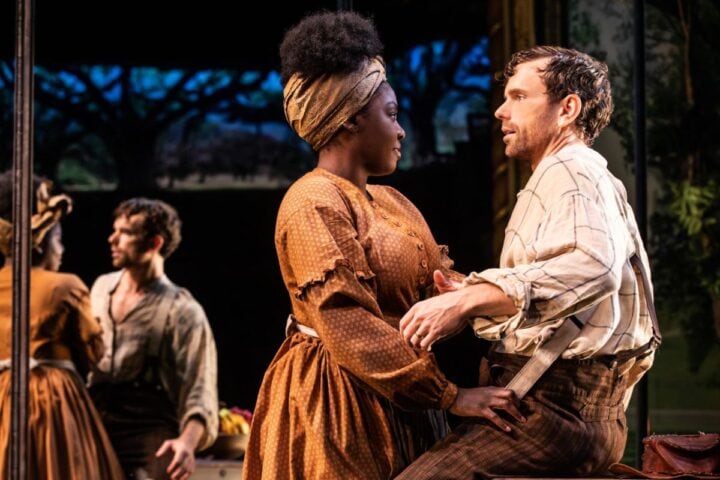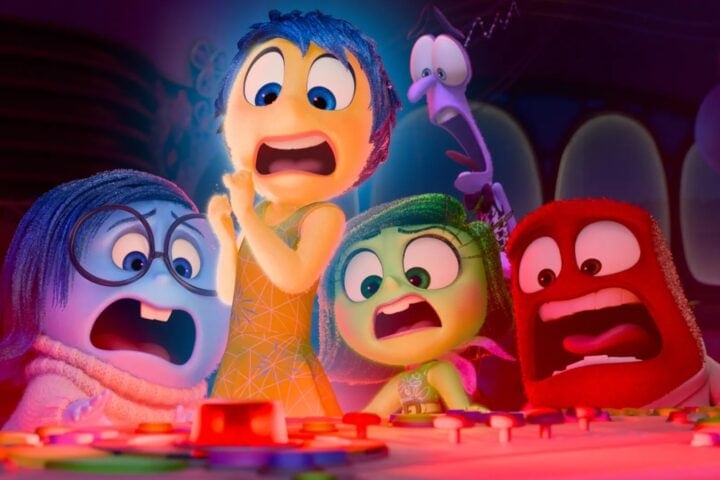When Tony voters looked at their ballots for best musical in 1960, they must have felt lightheaded. They were tasked with choosing a winner among the latest Rodgers and Hammerstein (The Sound of Music), a political drama that would go on to win the Pulitzer (Fiorello!), a new kind of psychological biography (Gypsy), and an uproarious fairy-tale comedy (Once Upon a Mattress). I’m not sure if any of the 2024 nominees for best musical will stand the test of time quite like that stunning lineup. But as was true 64 years ago, there are at least four celebrated contenders vying, all equally convincingly, for the top prize.
Part of what makes this season’s best musical category particularly tricky to predict is the volume of productions that aren’t on the ballot here: At various moments throughout the season, in which 15 new musicals opened (and six have already closed), it would have seemed inconceivable that shows like Here Lies Love, Days of Wine and Roses, and The Notebook would fall short of a nomination. An unusual number of voters, then, won’t see their favorite new musical represented here at all. And with an abundance of high-quality choices remaining, it’s hard to anticipate what will win when I’m still stuck deciding what should win.
Like 1960, it’s a surplus season across the board, really, resulting in Tony categories that feel more overstuffed with excellence than usual. For more evidence of excess, consider the five acting nominees for Stereophonic; the breakout sales for plays produced by nonprofit theaters like Jaja’s African Hair Braiding, Mary Jane, and Appropriate; and the three productions featuring on-stage rain scenes (The Notebook, The Outsiders, and Uncle Vanya).
The nice thing about seasons of plenty is that it’s clear going in that the losers will be in good company. (In 1960, Ethel Merman and Carol Burnett lost to Mary Martin, and A Raisin in the Sun fell to The Miracle Worker.) In a season with diverging box office receipts, critical responses, and audience reactions, the Tonys feel a little less like a definitive coronation and a little bit more like a well-earned finish line for a sumptuous, exhausting season.
Best Performance by a Leading Actor in a Play
William Jackson Harper, Uncle Vanya
Leslie Odom Jr., Purlie Victorious: A Non-Confederate Romp through the Cotton Patch
Liev Schreiber, Doubt: A Parable
Jeremy Strong, An Enemy of the People
Michael Stuhlbarg, Patriots
Michael Stuhlbarg’s outsized performance as the Russian political mastermind Boris Berezovsky seemed destined a month or two ago for a head-to-head battle with Jeremy Strong’s obstinately righteous Doctor Stockmann. But the poor Tony showing for Patriots (Stuhlbarg represents its lone nomination) and with the re-emergence of Purlie Victorious, which closed early this year, through the PBS Great Performances recording, Leslie Odom Jr. is very much back in the conversation. Still, for Succession fans most familiar with Strong for his contemptible, puerile Kendall Roy, his performance in An Enemy of the People is a 180-degree turn to marvel at. That impressive versatility on display should garner Strong his first Tony.
Best Performance by a Leading Actress in a Play
Betsy Aidem, Prayer for the French Republic
Jessica Lange, Mother Play
Rachel McAdams, Mary Jane
Sarah Paulson, Appropriate
Amy Ryan, Doubt: A Parable
In a star-studded category, don’t rule out beloved past winner Jessica Lange or Broadway newbie Rachel McAdams. But this has been Sarah Paulson’s Tony to lose since her caustically charismatic Toni Lafayette started shouting at anyone foolish enough to wind up in her fractured family in Branden Jacobs-Jenkins’s astonishing Appropriate. Paulson finds surprising nuance within each of this angry woman’s tortured relationships, and watching her play off her well-matched castmates is one of the highlights of the season.
Best Performance by a Featured Actor in a Play
Will Brill, Stereophonic
Eli Gelb, Stereophonic
Jim Parsons, Mother Play
Tom Pecinka, Stereophonic
Corey Stoll, Appropriate
The theater community’s expansive love for Stereophonic helped three actors to nominations here, but that may work against the show if voters can’t rally around one performance. The most likely contender might be Eli Gelb, as the hapless engineer Grover who gradually grows a spine, but both Will Brill and Tom Pecinka have their supporters, and the casual cruelty of Pecinka’s Peter is Stereophonic’s dramatic engine. More likely, then, the trophy passes to Corey Stoll for his extraordinary turn as Sarah Paulson’s brother and sparring partner in Appropriate.
Best Performance by A Featured Actress In a Play
Quincy Tyler Bernstine, Doubt: A Parable
Juliana Canfield, Stereophonic
Celia Keenan-Bolger, Mother Play
Sarah Pidgeon, Stereophonic
Kara Young, Purlie Victorious: A Non-Confederate Romp through the Cotton Patch
This one’s a bit of a tossup. Kara Young, who’s enjoyed three consecutive nominations in this category since 2022, was the early favorite to seal the deal for her stunningly funny Lutiebelle in Purlie Victorious. But Sarah Pidgeon’s artistically ambitious yet devastatingly self-doubting Diana seems like the most obvious role to win for Stereophonic, while Celia Keenan-Bolger, as a stand-in for the playwright in Paula Vogel’s semi-autobiographical Mother Play, anchors and animates that production. All said, voters may see this as the best opportunity yet to anoint Young formally as the surefire star that she’s become.
Best Performance by A Leading Actor in a Musical
Brody Grant, The Outsiders
Jonathan Groff, Merrily We Roll Along
Dorian Harewood, The Notebook
Brian d’Arcy James, Days of Wine and Roses
Eddie Redmayne, Cabaret at the Kit Kat Club
Charming as Brody Grant’s heartfelt Ponyboy Curtis may be in The Outsiders, this has become a two-way race between Brian D’Arcy James and Jonathan Groff—Hamilton’s original King Georges off-Broadway and on Broadway, respectively—who have each contended unsuccessfully for this trophy before. As an alcoholic husband striving to get on the wagon, James has the tougher, rawer assignment. But Groff imbues Frank, a character typically distinguished in past productions of Merrily We Roll Along by his callous self-interest, with redefining warmth. That’ll be enough to get him over the finish line, especially when flanked by Lindsay Mendez and Daniel Radcliffe. Not for nothing have the three of them been the toast of the town all season long, and voters will be eager to reward the trio in its entirety.
Best Performance by A Leading Actress in a Musical
Eden Espinosa, Lempicka
Maleah Joi Moon, Hell’s Kitchen
Kelli O’Hara, Days of Wine and Roses
Maryann Plunkett, The Notebook
Gayle Rankin, Cabaret at the Kit Kat Klub
Divided responses to Eden Espinosa’s high-belting take on the painter Tamara de Lempicka and Gayle Rankin’s unpredictable Sally Bowles didn’t keep the pair from earning nominations but will dampen their chances at a win. More likely is Maleah Joi Moon—though despite her brilliant vocal ornamentation, the role itself is pretty one-note—or the veteran Maryann Plunkett, as a dementia patient who sings only once in The Notebook. But only Kelli O’Hara, in her most extraordinary, heartbreaking performance yet, has a role worthy of her musical and dramatic talents, and that perfect match makes her the worthy frontrunner.
Best Performance by A Featured Actor in a Musical
Roger Bart, Back to the Future: The Musical
Joshua Boone, The Outsiders
Brandon Victor Dixon, Hell’s Kitchen
Sky Lakota-Lynch, The Outsiders
Daniel Radcliffe, Merrily We Roll Along
Steven Skybell, Cabaret at the Kit Kat Club
Finally nominated for his fifth Broadway appearance, Daniel Radcliffe won’t need to cast any summoning spells to guarantee the award coming his way. With his scalding rendition of “Franklin Shepherd, Inc.,” Radcliffe launches Merrily We Roll Along into the stratosphere.
Best Performance by A Featured Actress in a Musical
Shoshana Bean, Hell’s Kitchen
Amber Iman, Lempicka
Nikki M. James, Suffs
Leslie Rodriguez Kritzer, Monty Python’s Spamalot
Kecia Lewis, Hell’s Kitchen
Lindsay Mendez, Merrily We Roll Along
Bebe Neuwirth, Cabaret at the Kit Kat Club
Pundits have suggested for months that Lindsay Mendez’s dozens of missed performances (she’s expecting a baby in the fall) might cost her the win here. Baloney. Even if 25% of voters were unable to reschedule their tickets for a date with all three leads present, I’d still count on the other 75% to deliver this third, crucial acting award for Merrily We Roll Along. Mendez may be less of a household name than Groff or Radcliffe, but her star wattage onstage is undeniable. Kecia Lewis’s contralto-powered majesty and Bebe Neuwirth’s coy and heartbreaking dignity should put them close behind, but this is the Merrily We Roll Along trio’s year.
Best Direction of a Play
Daniel Aukin, Stereophonic
Anne Kauffman, Mary Jane
Kenny Leon, Purlie Victorious: A Non-Confederate Romp through the Cotton Patch
Lila Neugebauer, Appropriate
Whitney White, Jaja’s African Hair Braiding
Since Appropriate was ruled a revival under the “classics” rule (there have been many regional productions since the show’s off-Broadway premiere a decade ago), this category gives us the best chance to see the two biggest plays of the year—Appropriate and Stereophonic—go head to head. And while few directors could control the temperature shifts of the fury-filled Appropriate, not to mention pull off the closing coup de theatre, like Neugebauer has, Aukin has the edge: In managing the hyperrealistic pacing of David Adjmi’s script, with its overlapping conversations and tense silences, he’s as much choral conductor as director. (Appropriate and Stereophonic will also face off in every design category, and with the probable exception of scenic design, which Appropriate should nab, look for Stereophonic to sweep the rest.)
Best Direction of a Musical
Maria Friedman, Merrily We Roll Along
Michael Greif, Hell’s Kitchen
Leigh Silverman, Suffs
Jessica Stone, Water for Elephants
Danya Taymor, The Outsiders
I’d seen my fair share of Merrily We Roll Along productions before last year, and I’d written it off as a cool, unemotional show with some wonderful music. So imagine my surprise to find myself crying at every single song in Maria Friedman’s warm, pulsing, and absolutely enchanting revival. The hype is actually real with this one, and that’s due to Friedman’s remarkable clarity about the story she’s telling—from the impeccable casting of the central trio to the way that costume and lighting communicate the passage of time, every element of this production works together, a 1,000-piece jigsaw puzzle that somehow feels inevitable. Enough said: This one belongs to Maria’s Friedman.
Best Original Score
Adam Guettel, Days of Wine and Roses
David Byrne and Fatboy Slim, Here Lies Love
Will Butler, Stereophonic
Shaina Taub, Suffs
Jamestown Revival and Justin Levine, The Outsiders
It took me three tries—off-Broadway at the Atlantic and in the short-lived Broadway run—to fully appreciate the sorrowful depths of Adam Guettel’s score for Days of Wine and Roses. Most voters won’t have had that luxury, so this one will come down to two offerings that can be more immediately savored at first pass: Shaina Taub’s sweeping score for Suffs and Will Butler’s collection of songs (and song fragments) for Stereophonic. Stereophonic, of course, is a play with music, not a musical: David Adjmi shows us his characters recording and rewriting their album tracks over and over again, but we only hear a few songs in full. While some voters will be tempted to support the Stereophonic juggernaut narrative here, Taub is a clear enough frontrunner among the traditional musical theater scores to surpass the Stereophonic stans and “finish the fight,” as her protagonist Alice Paul (also played by Taub) sings.
Best Book of a Musical
Kristoffer Diaz, Hell’s Kitchen
Bekah Brunstetter, The Notebook
Justin Levine and Adam Rapp, The Outsiders
Shaina Taub, Suffs
Rick Elice, Water for Elephants
Suffs has a better shot at the new musical trifecta—musical, score, and book—than does The Outsiders, the only other show nominated in all three categories. And that’s in large part because of Shaina Taub’s exhaustive work to shape almost a decade of suffrage history into something dramatically compelling and, despite motoring toward an outcome we all know, suspenseful. Adam Rapp and Justin Levine’s adaptation of The Outsiders is the most convincing and moving of the three book-to-movie-to-musical contenders here. But Taub’s ingenuity in corralling Suffs’s disparate threads into a cohesive show will ultimately be rewarded. (And if Hell’s Kitchen’s book, the weak link of the show, should triumph early at the Tonys, erase all my answers and prepare yourself for a big night for the wayward jukebox.)
Best Orchestrations
Adam Blackstone and Tom Kitt, Hell’s Kitchen
Will Butler and Justin Craig, Stereophonic
Matt Hinkley, Justin Levine, and Jamestown Revival, The Outsiders
Jonathan Tunick, Merrily We Roll Along
Timo Andres, Illinoise
I question whether Jonathan Tunick’s revised orchestrations for Merrily We Roll Along, a more-than-a-decade-old adaptation of his original work from 1981, should qualify. And it’s a stretch to describe Stereophonic’s arrangements for four-piece band plus occasional tambourine as orchestrations in any traditional sense. It’s hard to vote against the legendary Tunick in an orchestrations category, but this category also offers the best chance to reward Adam Guettel for his gorgeous, complex music for Days of Wine and Roses. In the confusing melee, I think Timo Andres emerges as the winner, for pleasingly translating Sufjan Stevens’s Illinois (mostly featuring the songwriter on all the instruments) in a lush reimagining for the stage.
Best Choreography
Camille A. Brown, Hell’s Kitchen
Shana Carroll and Jesse Robb, Water for Elephants
Jeff Kuperman and Rick Kuperman, The Outsiders
Annie-B Parson, Here Lies Love
Justin Peck, Illinoise
An easy choice: Justin Peck’s wordless dance musical is the surefire winner for choreography. If Illinoise wasn’t in the mix, the Kuperman brothers’ thoughtful work blending fight and dance in The Outsiders would vie with Jesse Robb and Shana Carroll’s acrobatics in Water for Elephants. But there’s no silver medal at the Tonys and no show this season—or for some time—explores the body’s capacity for expressive storytelling quite like Illinoise.
Best Revival of a Play
Appropriate
An Enemy of the People
Purlie Victorious: A Non-Confederate Romp through the Cotton Patch
Accepting this award for Appropriate alongside playwright Branden Jacobs-Jenkins at the Outer Critics Circle Awards last month, Second Stage’s Artistic Director Carole Rothman spoke about the 39-year-old Jacobs-Jenkins’s deserved spot in a category alongside Ibsen and Ossie Davis. No doubt. The playwright’s long-delayed triumph on Broadway is sure to cement him in the upper echelon of living theater writers. And while Appropriate obviously isn’t a reimagined chestnut like this season’s effective productions of An Enemy of the People and Purlie Victorious, Neugebauer and her cast seem to plant this harrowing, hilarious play in the ground for future generations to take notice. A classic is born, and so, as of Sunday, is a Tony winner.
Best Play
Jaja’s African Hair Braiding
Mary Jane
Mother Play
Prayer for the French Republic
Stereophonic
In all the Stereophonic hype, let’s not forget the soft and searing Mary Jane, a warm meditation on giving and receiving care, and the communal joy of the hilarious Jaja’s African Hair Braiding, a closely observed celebration of Harlem’s most ebullient salons. When Slave Play set a record for most-nominated play in Tony history (12 in 2022), it went home empty-handed. Look for Stereophonic, with its shattering 13 nominations, to forge a more successful path as the new record-holder, all culminating in a straightforward win here.
Best Revival of a Musical
Cabaret at the Kit Kat Club
Gutenberg! The Musical!
Merrily We Roll Along
The Who’s Tommy
Another no-brainer of a category. Merrily We Roll Along will roll to victory here, an astonishing triumph for the revival of a show that belly-flopped on Broadway 43 years ago.
Best Musical
Hell’s Kitchen
Illinoise
The Outsiders
Suffs
Water for Elephants
While a win for Water for Elephants, the most critically divisive of the nominees, would be a shocker, the other four contenders feel, depending on the day, like shoo-ins for the prize. Reports of the Tony chances for Hell’s Kitchen, though, despite its 13 nominations and box office success, may be exaggerated. Yes, the sizzling vocal performances and the fresh arrangements of Alicia Keys’s songbook make this worth the price of admission. But those elements alone do not a best musical make, and voters—in awarding Kimberly Akimbo and A Strange Loop in the past two years—have been discerning enough to value things that Hell’s Kitchen conspicuously lacks, like clear storytelling and character development, in making their choices.
That’s why the race is really down to three: Suffs, The Outsiders, and Illinoise. The first two are traditional book musicals, a grand, uplifting staging of the war for women’s voting rights a century ago and a fierce, moving adaptation of a beloved novel, respectively. The third choice, Illinoise, is something rather different: a dance theater piece without dialogue that transforms Sufjan Stevens’s album Illinois into a gorgeous queer story of unrequited love and self-revelation. Some voters may question whether Illinoise is actually a musical—or, at least, enough of one to compete for the top prize. But it knows exactly what kind of story it wants to tell and how it wants to tell it. Better yet, its artistry never falls short of its ambitions.
After one of the wildest seasons of new musicals that Broadway has ever seen, we deserve a wild ending. So I’m going out on a wild limb to predict a tie—the first in this category since Fiorello! and The Sound of Music both won in 1960—between Illinoise and Suffs. “Progress is possible, not guaranteed,” sing Shaina Taub’s suffragists, and that’s true in art as well as social justice movements, as both of these new works, against the odds, move the medium forward.
Since 2001, we've brought you uncompromising, candid takes on the world of film, music, television, video games, theater, and more. Independently owned and operated publications like Slant have been hit hard in recent years, but we’re committed to keeping our content free and accessible—meaning no paywalls or fees.
If you like what we do, please consider subscribing to our Patreon or making a donation.






